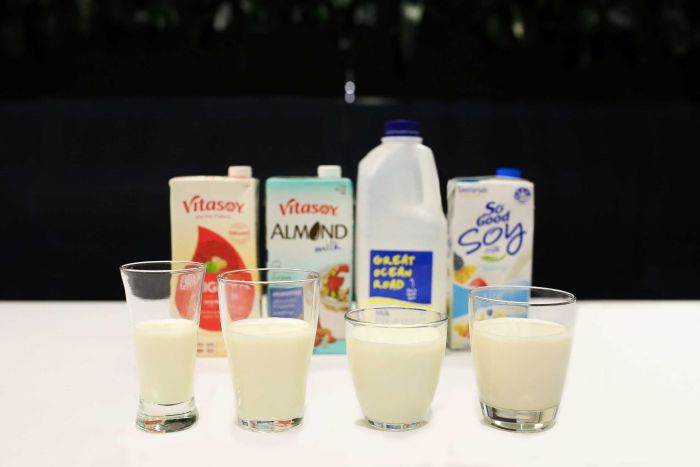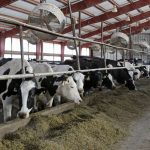
But research often points to old-school dairy milk being the more nutritious option to have in your cup of tea or coffee, or on your breakfast cereal.
And one nutritionist, who has worked alongside the dairy industry, believes misconceptions about plant-based milk’s health benefits over dairy milk was a clear sign the dairy industry needed a re-brand.
Nutritional food scientist Dr Anneline Padayachee said the idea that dairy milk was “worse for you”, health wise, was misguided, and the industry needed to ensure it did not become more unfavourable with consumers.
“It’s traditional. It’s children’s food. It’s seen as what you have a dash of in your cup of tea or on your breakfast cereal — when it is not that at all,” she said.
“Plant milks really are fixated on functional benefits, and they’re actually promoting their products on a range of health benefits for a specific health outcome.
“Dairy milk doesn’t really do that. It’s well intrenched as calcium, strong bones and strong teeth in children. It’s so much more than that.”
Alternative milks, or ‘mylks’ as they’ve been dubbed, still only represented a small share of the overall milk market but it has been increasing.
According to figures from Dairy Australia it has risen from 5 per cent to 7 per cent between 2010 to 2017.
That accounts for 95 million litres of milk.
It is a shift that is well documented, and while many reports attribute the change, in part, to intolerances, they say people are looking for a more environmentally friendly and healthier option to have in their morning coffee or on their breakfast cereal.
Dairy milk needs a re-brand
Dr Padayachee said there were a number of reasons why dairy’s reputation was taking a hit.
“In the 1970s and 80s fat was demonised,” she said.
“Then we’ve got the fact that your plant-based products are just that — plant based.
“We’re highly encouraged to have a more plant-based diet and we should. But that doesn’t not mean a plant-exclusive diet.
“So when you hear that, it automatically infers that if you have a plant milk it’s going to be healthier version. But it doesn’t actually mean that, it’s about your overall dietary quality.”
The nutritional benefits of milk have been seconded by senior spokesperson and accredited practicing dietitian for the Dietary Association of Australia, Margaret Hays.
She said consumers needed to be better informed on the best options for their diet and not fall for fashionable trends.
“It comes down to the individual and what they’re using it for,” she said.
“A lot of people don’t have any clue when I start explaining protein content, and vitamin and mineral content.
“There’s the information out there if people want to see it, but people are so quick to jump on board when someone is spouting-on about something.”
Dairy industry monitoring developments
The move from dairy milk to alternative milk has been recognised by the dairy industry’s main research body, Dairy Australia.
Managing director David Nation said dairy made up 93 per cent of milk sales.
But research done for Dairy Australia also showed about a third of consumers who purchased plant-based products also bought dairy milk.
Mr Nation said it would be a concern if consumers moved away from dairy for incorrect reasons, “if people have foregone milk for the wrong reasons and given up milk when it is actually the healthiest food they could be consuming,” he said.
Mr Nation agreed there was work to be done by the industry to give it a better name, nutritionally.
“Milk has been there forever, people have been consuming it forever, so it’s not new and funky,” he said.
“Our challenge is to continue to talk about the value that it has in everyone’s diet, at all ages.”
Debunking myths about dairy
Dr Padayachee said “flexitarians” looking to have a better impact on the environment and health were often the ones to move towards plant-based milk.
But nutritionally, plant-based milks were often inferior.
“If a plant-based milk is properly supplemented — so it has added calcium and different vitamins and minerals added to it — then from that perspective [plant based and dairy milk] are fairly similar,” she said.
“But if it does not have that we’re talking about ‘chalk and cheese’ from a nutritional perspective.”
Dr Padayachee said she was aware of many major plant-based milk brands that did not supplement their products, and even with supplements there were nutritional aspects of dairy milk that could not be mimicked.
“There are a lot of naturally bioactive components to milk,” she said.
“So, for example, protein in milk isn’t just protein — it’s split between casein and whey — and those types of proteins have a different rate of digestibility in the body which you can’t mimic.”
She said dairy’s nutrients were also more easily digested in the human body than other food products.
Does milk make you fat?
Dr Padayachee said another misconception about dairy milk was that its fat content was bad for you.
She said there was no doubt, comparing almond milk and full cream dairy milk, almond milk had considerably less calories.
But she said calories in general had been demonised when they should not be because overall health should not be measured on a food’s energy content.
“When you eat something you’re not just measuring energy, you’re also intaking nutritional composition,” Dr Padayachee said.
“The calories can come with a whole post of nutrients, or it can come with none.”
She said the fat content of milk was also relatively low compared to many other products.
“Full cream milk has got about 4 per cent fat max, so we’re talking about a product that is 96 per cent fat-free,” she said.
“If you think about that, other products make a huge marketing campaign about that. It’s not a bad thing.
“Plus, you also need fat to enhance your absorption of different nutrients as well.”
When are plant-based milks better for you?
When it comes to digestibility and nutrition, there is a clear time when plant-based milks are better for you.
“It would definitely be better for you if you’re lactose intolerant,” Dr Padayachee said.
There are also a number of reports that indicate plant-based milks are better for the environment.
According to a University of Oxford study, producing a glass of dairy milk results in almost three times the greenhouse gas emissions of any non-dairy milks.

























